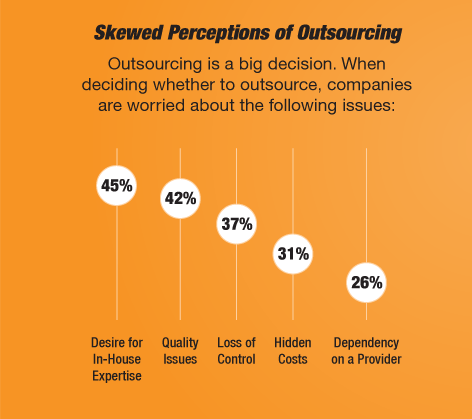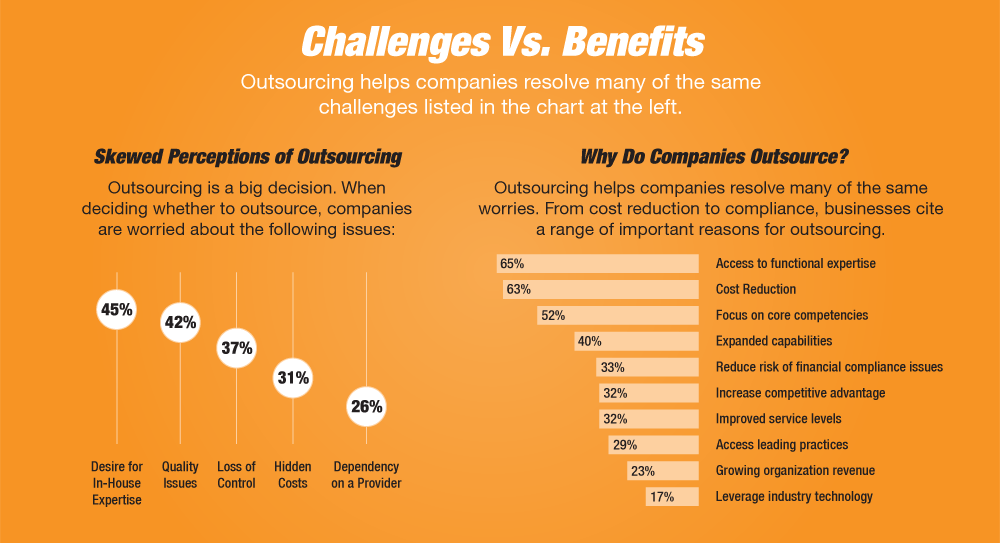According to a recent survey by Inc Magazine 64% of small and medium sized businesses already outsource – contrary to the popular belief outsourcing is a solution embraced by only large companies. What is interesting in this survey is that the biggest reason that small businesses outsource is not because of cost reduction as one is inclined to imagine but 65% of the small businesses actually outsource due to access to functional expertise. Although cost reduction itself is a close second at 63%, which is a bonus. So if outsourcing’s claim is being so beneficial to small businesses why shouldn’t more companies be doing it than the existing 64%, even though it is a clear majority. In this paper we are hoping to explore why small businesses consider outsourcing a risk or consider it undesirable and suffer from outsourcing anxiety. We also show ways that you could mitigate them.
Skewed Perceptions of Outsourcing

The top reason that companies decide against outsourcing is a “Desire for In-house expertise”. This ‘desire’ usually is not based on facts or data. Companies need to decide if this ‘desire’ is based on facts and data. Some questions that you’ll need to ask before outsourcing are, 1) Is the software development expertise a core part of your business and it’s revenue model? 2) Do you already own Intellectual property rights (IP rights) to the software that you are producing? 3) Does having an in-house team create a unique competitive advantage for your business? A fear of loss of business knowledge is healthy however, that can happen with in-house development as well when you have attrition, multiple vendors providing different services for your business. Outsourcing can actually benefit you by improving your business focus.
If you are a company that has raised capital or is raising capital by fundraising and your belief is that investors are interested in a local in-house team. Think again, that might be your own perception rather than the investor’s. Investors are interested in execution and market strategy than having an in-house development team that is performing badly and struggling to execute. Investors are interested in you driving vision, strategy and product management than focusing on day to day operations.
Quality Issues

This is one of the biggest data driven reasons that in-house is preferred over outsourced software development by companies. Most of us have heard horror stories of how a business or entrepreneur got screwed over on the quality of solution or product delivered at the end. The thing about quality is that it is at so many different levels and stages of the engagement. Quality can suffer in technical aspects like design, architecture, performance, infrastructure set-up, security, code maintenance and support and also in non-technical aspects like software development life cycle, communication and reporting process, release management and governance. This evaluation and assessment is something that we have addressed in a separate article. Sign up now to receive our entire article on How to evaluate your software development partner. Businesses and entrepreneurs need to evaluate development partners more wholistically than just their past work.
Dependency on your provider/partner
The consequences of this can be severe as we understand very little or no control over tasks performed by provider or partner companies. When contractual disagreementsdevelop there is very much a possibility of a difficulty to transition the engagement over to another provider or to bring it back in-house. This risk can certainly mitigated by delving into their process and their expertise on the tech stack. Does your development partner give you visibility into their internal processes? Are you able to access theirproject execution tools and communication channels when needed? What level of documentation do they provide on some of the critical business components and logic that they build?
The choice of the programming language used to build your software can play a vital role in what level of dependency you will have. Are their choices best in class? Do they adhere to industry best practices. There are very optimal programming languages that have been in the industry for over 3-8+ years. Your chances of finding talented programmers and developers who have expertise in those programming languages are higher than someone who may have a very specialized knowledge in a licensed and proprietary technology.
Communication – Language and Timezone

When you outsource your development to a different country, chances are your English is different from ‘their English’. The result? Your communication could be ineffective and soon you would feel frustrated. Finding out if the development partner has a team in your country should be of immense help. The team in your your country should not just be a sales and marketing team instead it should be a team that is technically qualified and capable of customer interaction and consulting. Be sure to evaluate if they are a culture fit for your business.
The effect of of time difference can range from mild to extreme. The time span between the west coast U.S. and Asia for example ranges from 12-14 hours. Again, this risk is mitigated by having at the very least a smaller local and technically qualified team that the development partner may already have. Be sure to understand and review their problem escalation process.
Access to expertise and scaling per your business

By partnering with a development company you gain instant access to the expertise and resources of the software development firm. Software development companies specialize in executing software projects and that’s what they do after all. However, there may be a risk if your business grows rapidly and your partner is not able to adjust to your scaling needs. The development partner’s sourcing of talent may be limited due to their location, company culture, provider’s financial viability,office infrastructure. Your partner may not have expertise in catering to enterprise software needs. It is definitely in your best interest to understand how your partner can scale and what kind of timeframe will they need?
Engaging with a development partner can be very successful or extremely frustrating. More than 64% small to medium businesses today are successfully engaging. You can see below how they benefit from outsourcing from the Inc magazine survey. Companies that establish and clarify theirbusiness goals for outsourcing are on track to be successful. Understand whether you are outsourcing for tactical or strategic reasons. Evaluate your risks wisely and find ways to mitigate them effectively.


